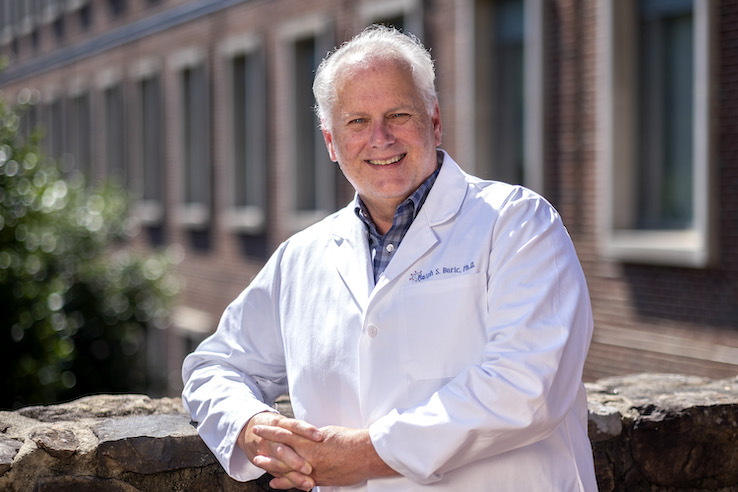Dr. Ralph Baric receives O. Max Gardner Award for coronavirus research
October 12, 2021

Dr. Ralph Baric (Jon Gardiner/UNC-Chapel Hill)
Ralph Baric, PhD — the William R. Kenan, Jr. Distinguished Professor in the Department of Epidemiology at the University of North Carolina at Chapel Hill’s Gillings School of Global Public Health — is the recipient of the 2021 Oliver Max Gardner Award.
Established by the will of former North Carolina Gov. O. Max Gardner, the award recognizes faculty who have “made the greatest contribution to the welfare of the human race.” The Gardner award is the highest honor the UNC System confers on faculty and is the only award for which all faculty members across the 17 campuses are eligible. The winner, who is selected by the Board of Governors of the University of North Carolina, receives a $20,000 stipend. The award was presented to Baric at UNC-Chapel Hill’s University Day on October 12.
Baric’s career is guided by his drive to take on seemingly insurmountable challenges while inspiring others to do the same and make the world a better and safer place. He has spent the past three decades as a global leader in the study of coronaviruses and is responsible for UNC-Chapel Hill’s world leadership in coronavirus research. Due to his expertise, Baric has been uniquely positioned to respond to public health needs during the COVID-19 pandemic.
“My congratulations to Dr. Baric on receiving this award,” said UNC Board of Governors Chairman Randy Ramsey. “Dr. Baric has provided life-saving coronavirus treatment options for the people of our state, our nation and the world. We are proud of the good work he has done to protect and promote public health and are privileged to present him with the highest honor given to any faculty member across the UNC System.”
“Dr. Baric’s research has helped us chart a path to safety and recovery during the pandemic, and his study of infectious diseases has prepared us for the next challenge that will surely present itself,” said UNC System President Peter Hans. “I hope it is many, many years from now, but we will be better equipped to provide safe, effective treatments due to Dr. Baric’s efforts.”
Baric is also a professor in the Department of Microbiology and Immunology at the UNC School of Medicine and a member of the UNC Lineberger Comprehensive Cancer Center. He has studied the factors that regulate virus cross-species transmission, replication and pathogenesis, using coronaviruses, noroviruses and flaviviruses as models. His lab pioneered new strategies for monitoring emerging coronavirus and flavivirus genomes.
The COVID-19 pandemic has been characterized as unpredictable. Based on his work with SARS and MERS, however, Baric knew it was a matter of when — not if — another viral zoonotic spillover event would occur. His research team, along with partners at biotech company Gilead Sciences, had already shown that the drug remdesivir was a broadly acting treatment against all known coronaviruses. Remdesivir subsequently was used to save thousands of lives during the pandemic.
Clinical trial results showed that a second drug researched by the Baric Lab — molnupiravir — reduced COVID-19 hospitalizations and deaths by half. It also was shown to be effective against all known coronaviruses. The drug is currently being evaluated by the United States Food and Drug Administration for potential emergency use authorization. If approved, the antiviral pill could be available by the end of 2021.
Baric’s seminal research on coronaviruses also aided the development, testing and rollout of the Moderna vaccine, which has been used by millions in the U.S. In April 2021, his lifetime of work was recognized through his induction into the National Academy of Sciences, a widely accepted mark of excellence in science that is considered one of the highest honors a scientist can receive.
This kind of planning for the future also led to another important collaboration between the UNC Gillings School, UNC School of Medicine and UNC Eshelman School of Pharmacy to combat not only SARS-Cov-2, but also future viral outbreaks. Called READDI (Rapidly Emerging Antiviral Drug Development Initiative), the group’s focus is on the development of broad-spectrum antivirals, which attack most, if not all, viruses in a particular family, similar to how antibiotics attack a host of different bacteria.
“This is a strategy we can apply that will make drugs immediately available for future pandemics, for our children and our children’s children,” Baric said. “I think we can have things set up so this amount of human suffering will never have to happen again. That would be my hope.”
Contact the UNC Gillings School of Global Public Health communications team at sphcomm@unc.edu.
